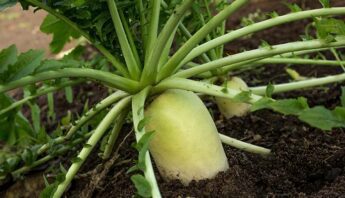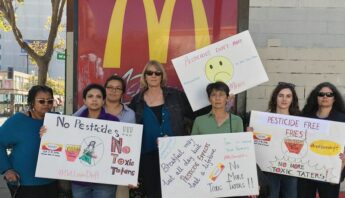As I follow the news from this very unusual (!) presidential election cycle, it’s clear that food and farming issues aren’t high on the political agenda — which is a shame. Fixing our very broken system could help us tackle a wide range of health, equity and environmental issues, including our resilience in the face of a changing climate.
The need for food system reform also showcases the broader, deeper problem of undue corporate influence on both politics and policymaking. As the powerful “Big 6” pesticide and biotech corporations further consolidate into the (even bigger) three or four, the stranglehold of these multi-nationals on food and farming will only tighten.
This is exactly why we’re supporting the Plate of the Union campaign, a broad-based effort to bring food issues onto the national political stage during this presidential campaign season. As one advocate told the New York Times in a recent article about the campaign, food is not a “red or blue issue.” It is, however, political.
Making change from the ground up
Across the country, people are increasingly engaged with food not just as consumers, but as citizens. At the local level, for example, there’s been an explosion of active Food Policy Councils influencing everything from school district menu guidelines to land-use rules for urban farming.
Cities and counties across the country are declaring themselves “Honey Bee Havens” as they commit to eliminating use of bee-harming agricultural chemicals on public lands. Protecting pollinators from pesticides has also gained traction in several states, from California and Colorado to Minnesota and Maryland.
Rural communities are starting to call for new rules to protect their children from drifting agricultural pesticides, and farmers are pressing for protections from the costly crop damage so often caused by herbicide drift. In Hawai’i, widespread public engagement around buffer zones, pesticide-use reporting and support for indigenous farming practices is bringing new candidates into the political process across the islands.
In short, citizens are stepping up.
Translating progress into power
All this engagement at the state and local levels is exciting and important. But as the recent, discouraging setback on GE labeling shows us, we need to engage effectively at the nation level, too.
As long as national rules and incentives bend to corporate pressure and support the status quo, we’ll stay stuck with this fragile, top-down industrialized system of food and farming. All that progress being made in statehouses and county councils across the country? It needs to be proactively translated into political relevance — and power — in Washington, D.C.
Bringing food into the national political conversation will make a difference, and that’s where the Plate of the Union comes in. The campaign is mobilizing groups and individuals from across the country to find creative ways to put food issues on politicians’ plates. The campaign food truck made the politics of food visible at both party conventions last month, and will be crisscrossing the country — with a focus in key swing states — to keep raising questions about food and farming for candidates up and down the ticket.
In the end, it comes back to one of the key lessons from this wild election season: If democracy is going to work, it’s time to get corporate money out of politics. And democratizing the food system is a great place to start.








